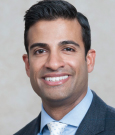James D. Murphy, MD, MS, Assistant Professor in the Department of Radiation Medicine at the University of California, San Diego, received a 2012 Conquer Cancer Foundation (CCF) of ASCO Young Investigator Award for his research focusing on access to the delivery of palliative radiation therapy. Dr. Murphy’s research confirmed his suspicion that there were substantial racial and age-based disparities in access to this treatment. “Ultimately, we hope that understanding these barriers will fuel further research aimed at improving access to care,” said Dr. Murphy.
“This grant provided the foundation for avenues of research that I continue to pursue,” he continued. “Currently, we have multiple ongoing health outcomes research projects focusing on palliative care, which all stemmed from the Conquer Cancer Foundation grant.”
Dr. Murphy’s Young Investigator Award was generously supported by the ASCO Clinical Practice Committee.
Researcher Spotlight
The link between obesity and breast cancer has long been established, but Neil M. Iyengar, MD, Assistant Attending Physician at Memorial Sloan Kettering Cancer Center and recipient of a 2013 Conquer Cancer Foundation of ASCO Young Investigator Award, was not satisfied that research had yet disclosed the full story.
Traditionally, studies about the link between obesity and breast cancer have focused on measurements of size, like body mass index or waist circumference. In the course of their study, Dr. Iyengar and his team identified a different measurement by looking specifically at the adipose tissue in the breast.
They identified a process called white adipose tissue inflammation, which Dr. Iyengar explained is “inflammation in the fatty tissue in the breast that leads to increased estrogen signaling [there].” This inflamed fatty tissue was present in 90% of the patients with breast cancer in Dr. Iyengar’s study who were obese and 30% of patients in the study who were not obese.
Dr. Iyengar’s hope is that with further study, his preliminary data will help better define the populations whose metabolic health puts them at increased risk of breast cancer. “By defining a more precise population for breast cancer prevention, we’ll be more successful in identifying effective, biologically targeted intervention strategies for breast cancer,” he said.
Dr. Iyengar’s Young Investigator Award was generously supported by the Breast Cancer Research Foundation. ■
© 2015. American Society of Clinical Oncology. All rights reserved.



